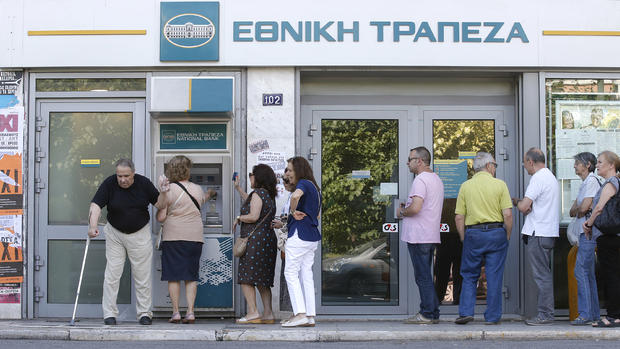Greece gets nod for billions in new loans
BRUSSELS - Greece is cleared to receive the first installment in a bailout that will forestall -- at least for now -- a debt default by the cash-strapped country.
Finance ministers of the 19-nation euro single currency group said Friday they have approved the first 26 billion euros ($29 billion) of a vast new bailout package to help rebuild Greece's shattered economy.
Eurogroup chairman Jeroen Djisselbloem said Friday that "of course there were differences but we have managed to solve the last issues."
Ten billion euros will be made available to recapitalize Greece banks, while a second slice of 16 billion euros will be paid in several installments, starting with a 13 billion euro installment by Aug. 20 when Greece must make a new debt payment to the European Central Bank.
"On this basis, Greece is and will irreversibly remain a member of the Euro area," said European Commission President Jean-Claude Juncker after the deal was sealed.
The final rescue package would eventually give Greece up to 86 billion euros ($93 billion) in loans over three years in exchange for harsh spending cuts and tax hikes.
The deal must still be approved by some national parliaments, including Germany, but that is largely considered to be a formality. Some nations, such as Finland, have already given their approval.
The move saves Greece from a disorderly default on its debts, which could have come as soon as next week and helps to cement its membership of Europe's single currency.
But the bailout is also conditioned on Greece implementing painful government spending cuts and tax hikes that add up to more hardship for Ordinary Greeks. The rescue package requires the country to maintain a budget surplus equivalent to 3.5 percent of the country's gross domestic product.
Some analysts say that fiscal goal is unrealistic given Greece's ongoing depression, which worsened in recent weeks after Greeks banks were forced to close.
"Indeed, the downturn in the economy looks likely to push the primary budget sharply back into deficit in the coming quarters," Jonathan Loynes, chief Europe economist with Capital Economics, said in a note. "That would point to the need for considerable extra austerity, with corresponding further damage to the economy."
Officials at the International Monetary Fund, one of Greece's main creditors, also say the country's sputtering economy is unlikely to recover without debt relief.
"I remain firmly of the view that Greece's debt has become unsustainable and that Greece cannot restore debt sustainability solely through actions on its own," IMF Managing Director Christine Lagarde said in a statement after Friday's funding agreement.
The approval came after a marathon overnight session in Greece's parliament that divided the governing party, raising the specter of early elections.
The bailout bill passed thanks to support from opposition parties, with 222 votes in favor, 64 against, 11 abstentions and three absent in the 300-member parliament.
Although approved by a comfortable majority, the result was a blow to Prime Minister Alexis Tsipras, who saw more than 40 of his 149 Syriza party lawmakers vote against him. He has come under intense criticism from party hardliners for capitulating to the creditors' demands for budget cuts -- austerity measures he had promised to oppose when he won elections in January.
The bill increases personal, company and shipping taxes, reduces some pensions, abolishes tax breaks for some groups considered vulnerable and implements deep spending cuts, including to the armed forces.
State television said Tsipras was expected to call a vote of confidence in his government, but that was not confirmed. Government spokeswoman Olga Gerovasili said any action would come after Aug. 20, when Greece has to make a large debt repayment to the European Central Bank.
Tsipras has maintained his public popularity in Greece despite his U-turn on austerity policies, and consistently leads opposition parties in opinion polls. An election would allow him to remove the hard line elements from his party, but it is not a risk-free option.
"An election in the next few months would create more political uncertainty, delay economic recovery and impede reform implementation and the possibility of opening talks on debt relief as desired by the IMF as a condition of its involvement in funding the program," said Joan Hoey, analyst for Europe at the Economist Intelligence Unit.
